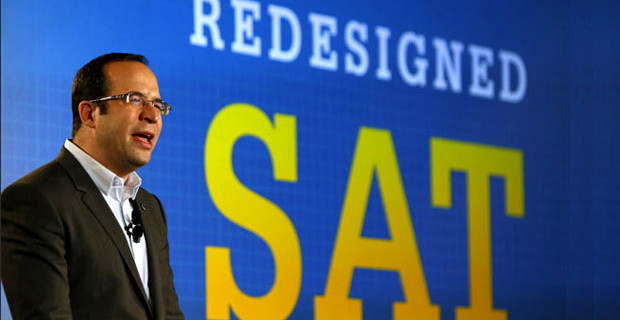Common Core Architect David Coleman’s Imperial College Board
What happens when a school board decides not to implement the new AP U.S. History standards wholesale and insist that such courses not present a distorted anti-American version of history? Common Core is creeping into college, taking over the rightful role of professors, as I report at the Selous Foundation, in my article, “Common Core: K-16 Education.” It’s also creeping in via the AP exams that give students college credit. The College Board, which directs the AP coursework and exams, under the direction of its president David Coleman, “architect” of Common Core, is now using its muscle to usurp local boards of education. The most recent example comes from the Denver area, in Jefferson County.
Several days ago, the teachers union, objecting to the school board’s decision to review the standards, manipulated high school students into staging a multi-day walkout. While most newspapers simply reported that students objected to “censorship” or a biased “conservative” version of American history, Michelle Malkin reported the real story of teachers using the controversy to recruit students to protest for their own aims, keeping the leftist history standards and doing away with teacher evaluations.
The teacher union activists’ agitation has had its effect. It’s chilling to the idea of local representative government. USA Today reports that the review of the standards has been shelved for a compromise proposal, which will now include administrators, students, and parents.

Fannery-O’Connor 1947
Dissident Prof reminds readers of Flannery O’Connor’s famous essay about allowing eight-graders to choose the literature they’d like to read, “Total Effect and the Eighth Grade,” wherein the wise woman reminds the adults, “Ours is the first age in history which has asked the child what he would tolerate learning. . .”
The Devil of Educationism: This is a problem of “Educationism,” a “devil” which can be “‘cast out only by prayer and fasting.'” She notes that at one time children’s attention was held by Homer and Virgil, but “our children are too stupid now to enter the past imaginatively.” What would she say now that school board members, parents, and teachers are asking students what they want to learn in history? Back then, 50-some years ago, O’Connor posed, “No one asks the student if algebra pleases him or if he finds it satisfactory that some French verbs are irregular, but if he prefers Hersey to Hawthorne, his taste must prevail.”
The taste for takin’ it to the streets has prevailed, and it seems that protest, or mob action, has had the intended effect.
What also probably “helped” was the directive last Friday from the College Board, under the leadership of David Coleman. It began:
The College Board’s Advanced Placement Program® supports the actions taken by students in Jefferson County, Colo., to protest a school board member’s request to censor aspects of the AP U.S. History course. The board member claims that some historical content in the course “encouraged or condoned civil disorder, social strife, or disregard for the law.”
Do these minors have the maturity and judgement to make decisions about protesting? Well, if they agree with the College Board’s radical agenda, yes. In fact, their lawlessness is cast as being the pinnacle of patriotism:
These students recognize that the social order can—and sometimes must—be disrupted in the pursuit of liberty and justice. Civil disorder and social strife are at the patriotic heart of American history—from the Boston Tea Party to the American Revolution to the Civil Rights Movement. And these events and ideas are essential within the study of a college-level AP U.S. History course.
Are “civil disorder and social strife” at “the patriotic heart of American history”? Many would differ. Many would take issue with aligning students skipping class with the brave men facing possible death in a war. The opinions on civil disobedience are not unanimous. But in the classroom, it is now taken as doctrine that mob protest, shouting, placard-carrying, and civil disobedience are the highest forms of civic action. This is no accident. Teachers and textbooks have been promoting this line for decades, and Common Core is accelerating this view, much of it through substituting group work and social justice activity for reading and writing. So the students are right because they agree with the College Board’s view of history. Did I mention that logic is also being shirked under the Common Core conglomerate?
Ignoring evidence and the historical record of its work, the College Board then presented an altered version of its own history:
The College Board will always listen to principled concerns based on evidence—and in fact has announced a public-review process for the AP U.S. History course framework. But in light of current events, an important policy reminder is in order:
Insisting that teachers and college faculty “collaborate” in designing the AP courses and exams, while allowing them “flexibility” to examine local topics, the College Board reminds those who resist the detailed 98-page directive,
To offer a course labeled “AP” or “Advanced Placement,” a school must agree to meet the expectations set for such courses by the more than 3,300 colleges and universities across the globe that use AP Exam scores for credit, placement, or consideration in the admission process.
The final boot comes down with a threat:
As vital context for the courageous voices of the students in Colorado, the AP community, our member institutions and the American people can rest assured: If a school or district censors essential concepts from an Advanced Placement course, that course can no longer bear the “AP” designation.”
The bold is in the original. Perhaps a review of some texts from the Soviet Union might be in order in this curriculum in order to give students some perspective. With video games, informational texts, such as EPA directives, and Common Core comic books replacing foundational works like the Federalist Papers, and, fiction, such as Animal Farm and 1984, students might be misled into believing that those who toe the line of a powerful agency, supported by millions of dollars of government funds, and federal diktats over “equal access” are really “courageous voices.”


